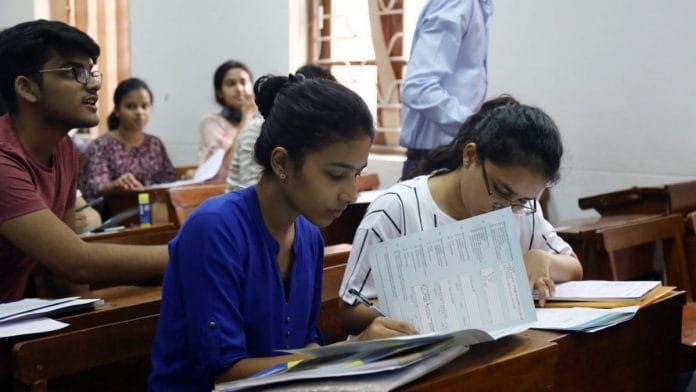New Delhi: On-demand exams should be introduced at the undergraduate level, a University Grants Commission (UGC) panel has suggested to the Modi government, emphasising that “exams should be held when the learner is ready”.
“Assessment can take place when the learners consider themselves ready to appear. Thus readiness depends on the learner and not institutions,” the panel has recommended in its report submitted to the UGC last week.
It further added that such a system may result in a reduced number of failures and malpractices in examinations.
Under the plan, there will be extensive use of technology and automation and question papers would be drawn from a question bank.
The UGC panel on evaluation reforms was set up in May 2018 and was chaired by Bharati Vidyapeeth Vice-Chancellor M.M. Salunkhe to work on matters related to rejigging examinations.
The panel has also recommended that a board be constituted to take care of the operational part of conducting on-demand examinations.
The on-demand exam should start with distance mode programmes and then be open to all other programmes, without any age or eligibility restrictions, the panel has said.
The committee worked on evaluation reforms based on the fact that graduates and postgraduates passing out of the Indian institutions are not employable.
It has suggested in its report that to change the situation, the evaluation methods must focus on learning outcomes, knowledge, attitudes and skills.
Also read: UGC makes it mandatory for PhD students to learn about research ethics, plagiarism
Mixed response to move in academic circles
Teachers and students have a mixed response to the idea, with professors saying it will be a good idea, to begin with, but will be difficult to implement.
“It is a good idea on paper to be friendly to students and give them more flexibility but it will be very difficult to implement on the ground,” said Bipin Tiwari, who teaches at the Political Science Department in Delhi University.
“You have to understand that there are many things that are required in exams… Then there are a lot of exams and subjects. How will we adjust various semesters, subjects and students according to their demands?”
Professor Amita Singh, who teaches at the Centre for the Study of Law and Governance at JNU, echoed a similar sentiment.
“A university is not a call centre that can work 24X7 to fulfil the demands of innumerable students,” Singh said.
“Academic preparation needs discipline, a conducive environment for students to think, discuss and debate while preparing for exams. There should also be the availability of libraries, books, coffee shops and hostels.”
Students believe that if implemented, the on-demand exams would resemble the G-MAT tests.
“If exams are held on-demand, it will be something like the G-MAT where one prepares for an exam for two to three months and writes when ready,” said Himanshu Gupta, a first-year student at Delhi University.
“Students will be at an advantage if something like this is implemented but I am not sure if Indian universities will be able to do that.”
Also read: For 2 years from 2014, Indian graduates became more employable. Then their growth stagnated
Panel also champions relative grading system
The panel has also suggested the relative grading system, the Cumulative Grade Point Average (CGPA) method, is followed in place of absolute grading.
A number of private universities have now switched to the CGPA method, which involves awarding points to students on a scale of 1 to 10 with 10 being the highest and 1 being the lowest.
The Indian Institutes of Technology (IITs) have been following the CGPA method of assessment for a long time now. The panel recommends that other institutions also adopt it.
Also read: UGC to launch 10 women-centric academic chairs, Subbulakshmi & Ahilyabai Holkar on list







On demand exams already exist. They are known as looking for a job and are on demand for the employers not students !! This is another way to increase pool of unemployable graduates. We need to prepare students for a work life where things are demanded from them at a time needed by the business and not ‘at their own pace’
This is really very helpful. Not all students can absorb at the same pace. They should seriously try to implement this.
Government should go a step ahead and scrap all undergraduate level arts and commerce streams colleges replacing them by web based instructions containing videos, chats, etc. Private colleges can organize subject wise discussion groups, seminars etc. covering thse subjects. The exam should be on demand by the students. This will save government lot of expenses which can be used to strengthen primary and secondary education services. Further, this will free students to do any other activities they would like to do.
Further, for many areas like sociology, politics, various languages etc, government should completely withdraw from running University departments and open it only for private colleges. This will stop pernicious student politics and waste of government expenditure. JNU, Jamia Milia, AMU, Jadavpur Universities should be the first one to implement this. Government should only focus upto 12th standard education and improve its quality. The higher level education only in science, engineering and mathematics should be funded by government.